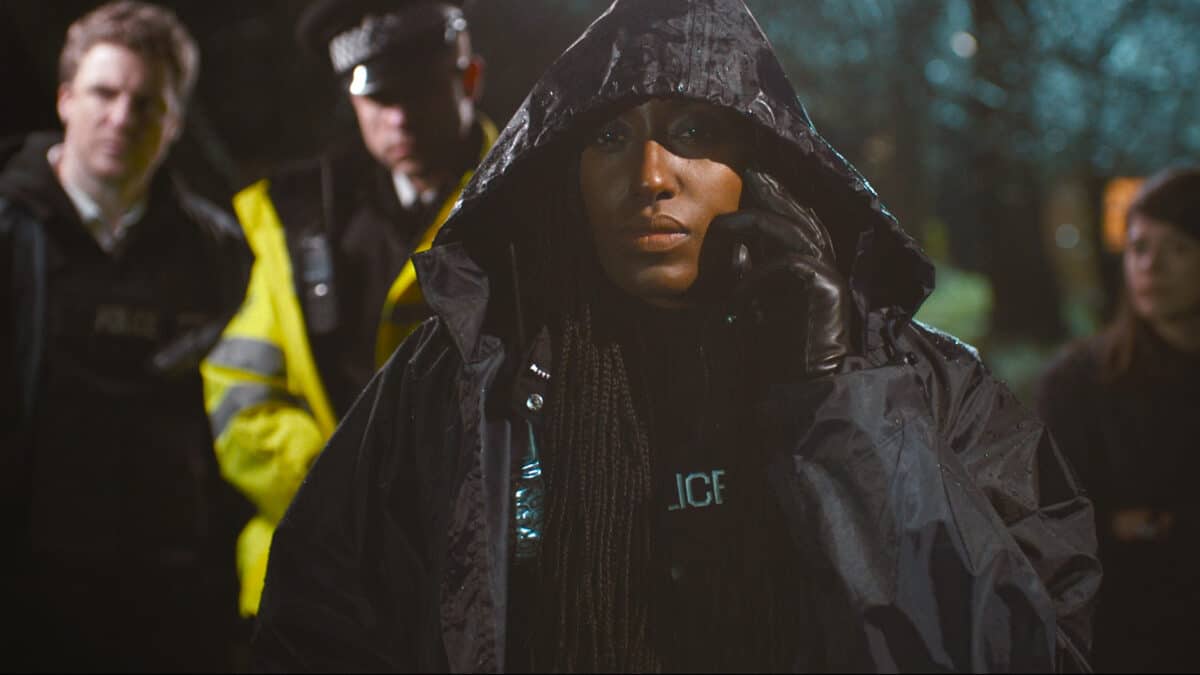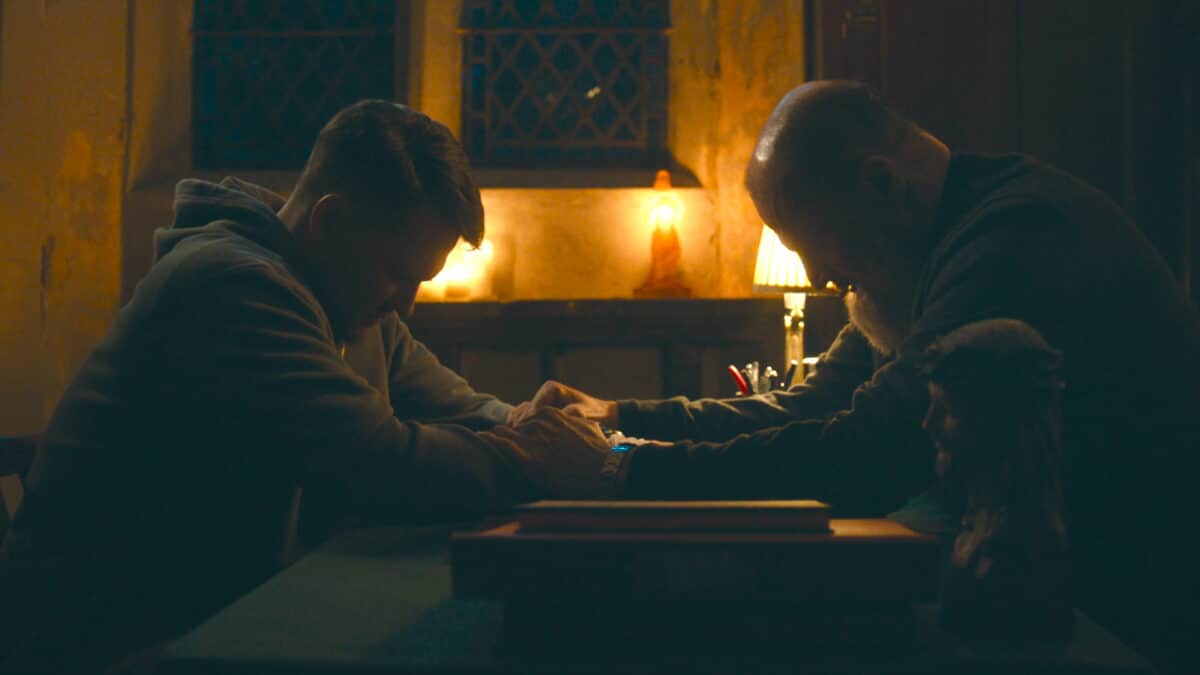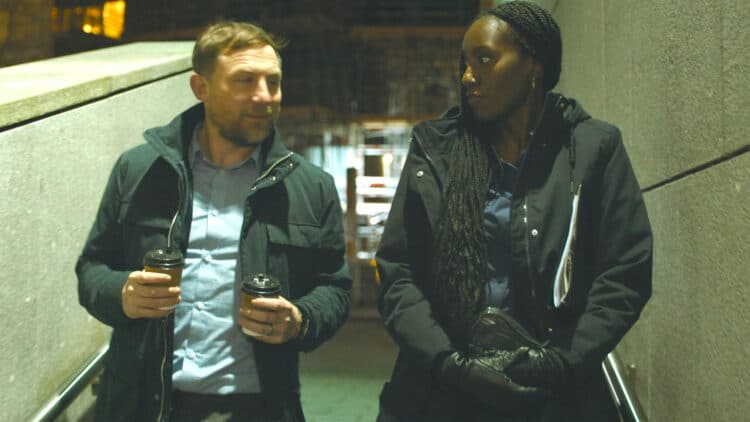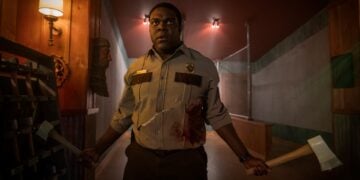It isn’t every day that a crime thriller reveals who the serial killer is within the first act and a half, but filmmaker Fredi ‘Kruga’ Nwaka’s Forgive Me Father chooses to play it this way rather than go down the road of whodunit. Instead, the writer-director leaves the motivation up in the air until the end. What this does is it changes the dynamics of the plot, leaving the audience worried that the cops might be targeting the wrong character, or if there’s another potential twist down the road.
What is Father Forgive Me about?
Forgive Me Father opens with Detective Bailey (Cindy Humphrey) attempting to figure out who mutilated and murdered the Farmer family at their home. Her search leads her to the slain family’s surviving relative, Patricia Farmer (Annabel Davis); however, the woman appears to be less than willing to talk when confronted with evidence. The police also find out that a purple car departed the crime scene, but they struggle to solve the crime and why someone would commit such a hateful act against the Farmers.
Two years pass, but Detective Bailey hasn’t forgotten the case; she feels a close attachment to it because she, too, lost her family in the past, though to a car accident not murder. One evening, she gets called out to a church where a young man named Glen (Bradley Turner) runs from the police and hides inside with his daughter and a priest (Tim Faraday). Detective Bailey finds out that Patricia was kidnapped and the authorities tracked her phone;s location to the church. The Farmer family killer is inside, and news flash: It isn’t Glen’s daughter.
An eye-catching film, but the story needed a lot more work

Fredi Nwaka and cinematographer Stuart White give Forgive Me Father a glossy aesthetic that deceives the gritty undertone of the story. Much like Dion Beebe’s work on Michael Mann’s Miami Vice, or even Greig Fraser in Matt Reeves’ The Batman, there’s something intoxicating about these beautiful, scenic shots that capture the souls of the respective cities, even if there’s a sinister element residing in each of them. Ross Gregory’s score plays a pivotal role here as well, adding to the constant foreboding ambience.
The script, though, doesn’t match the majesty of the cinematography. In an attempt to add multiple layers and biblical metaphors to the story, it becomes unnecessarily convoluted and muddled. One doesn’t need to be a script consultant to see that too many rewrites and last-minute additions went into this, veering the narrative off the track of what must have made it compelling to begin with. In comparison, look at the best story arcs from Luther – they’re simple and easy to follow, not trying to do too much or incorporate every possible trope from the genre. A little simplicity could have gone a long way here.
That isn’t to say Forgive Me Father is impossible to follow, but the climax leaves a lingering air of confusion and trying to figure out if it all makes sense. While it’s appreciated how the film runs for a lean 75 minutes – an anomaly in a time when directors want to give you four-hour cuts of characters harvesting grain – certain scenes and plot points could have benefited from more elaboration or expansion.
Tim Faraday and Bradley Taylor carry the film on their dialogue exchanges alone

Performance-wise, Forgive Me Father gets carried by Bradley Taylor’s Glen and Tim Faraday’s Father Blakefield. Their dialogue-heavy scenes revolve around their characters discussing the possibility of salvation and forgiveness, as they open up to each other about their pasts. While a few of their talks are as on the nose as they come, the actors maintain the suspense and make it believable to those watching.
While Cindy Humphrey’s Detective Bailey serves a crucial part in the story, there isn’t enough meat to her character arc to make her a memorable lead. This isn’t the fault of the actor, though, as she can only work with what’s on the page and written for her. It never feels like the story gets into the impact of Detective Bailey’s family’s death or why this specific case matters so much. Instead, the character comes across as every other hardened police officer in a crime story.
Is Forgive Me Father recommended?
While Forgive Me Father isn’t the best crime thriller of 2024, or likely to even be in the top five, it contains moments of marvel. At times, it comes across like a longer episode of a British crime series like Line of Duty or Luther, and that’s said as a compliment. If anything, it demonstrates that Fredi Nwaka possesses incredible potential as a director and he’s a name to watch out for in the future.
RELATED: Classified Movie Review – Aaron Eckhart’s Action Thriller Shoots Itself in the Foot
Forgive Me Father |
|---|
When a number of mutilated bodies are discovered in a mansion, seasoned Detective Taylor is charged with finding the killer. An unlikely suspect reveals that some secrets are taken to the grave and some secrets take us to the grave |
 |
|---|
| Studio: Kaleidoscope Home Entertainment |
| Running Time: 1h 17m |
| Release Date: 4th November 2024 |
| Cast: Tim Faraday, Simon Haines, Celine Arden, Tara Hoyos-Martinez, Cindy Humphrey, Fredi 'Kruga' Nwaka, Nicholas Clarke, Bradley Turner |
| Director: Fredi 'Kruga' Nwaka |
| Writers: Fredi 'Kruga' Nwaka |
| Genre: Thriller |
| Box Office: N/A |
The Review
Forgive Me Father
Forgive Me Father looks fantastic, but the story falters.
Review Breakdown
-
Verdict

















